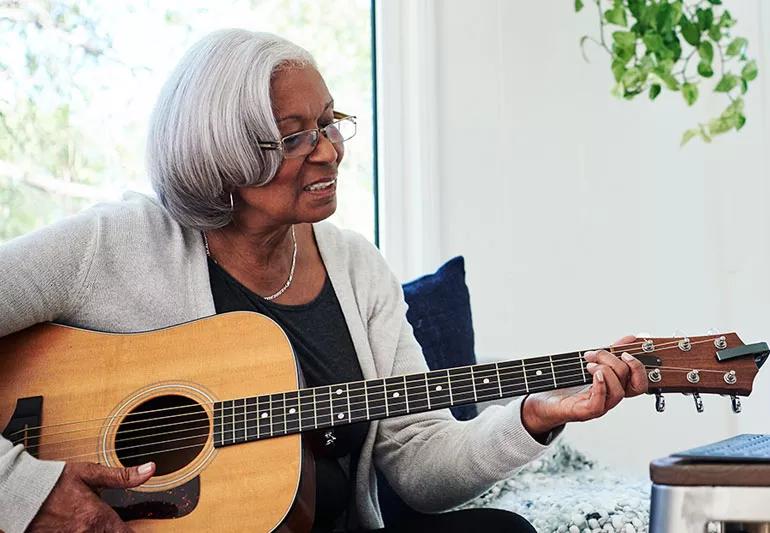Top your to-do list with friends, family and activities

Image content: This image is available to view online.
View image online (https://assets.clevelandclinic.org/transform/4c428fa0-561f-4d78-8d77-78fc699faa04/retiredLearnGuitar2-1020353326-770x553_jpg)
Retired woman learning to play guitar
You spend years preparing to retire. You plan carefully so you can afford to leave your job behind and enjoy your well-earned free time. But do you have a plan for how you’ll fill that time or who you will spend it with?
Advertisement
Cleveland Clinic is a non-profit academic medical center. Advertising on our site helps support our mission. We do not endorse non-Cleveland Clinic products or services. Policy
It’s not something to take for granted. Without careful planning, retirees are at risk for slipping into isolation, inactivity and poor health, says geriatrician Ronan Factora, MD.
“People look forward to retirement, but they haven’t really thought about how they’re going to spend their time,” he says. “They spend a lifetime doing nothing but work and don’t cultivate any other activities or social contacts.”
So take time to give it some thought. Dr. Factora advises thinking realistically about what you’re going to do all day.
“You cannot spend that time just sitting and watching TV,” he warns. “Everything declines if you’re sedentary.”
Evidence is mounting on the dangers of sitting too much: Your blood sugar, blood pressure, cholesterol, muscle tone and cognitive faculties all could suffer.
“Activity is the most important way to maintain your health and quality of life,” Dr. Factora says.
Staying connected to others is also vital. Your friends and family are more important than ever after you retire.
“It’s easy for loneliness to slip into clinical depression,” he notes. “And it’s hard to treat depression when the root cause is a lack of social support.”
He offers eight tips to help you plan for an active, engaged retirement:
Advertisement
Think about how much time you realistically can expect to spend with family every day.
Do you have adult children nearby who will have time to spend with you? Will you spend time caring for grandchildren? Do you have a spouse or other family member who requires care?
If you’re married, think about how your retirement will affect your relationship.
If your spouse is already retired or is a homemaker, what will it be like for both of you to stay home all day? If your spouse is still working, will expectations change about things like cooking and cleaning?
Start thinking about your hobbies — either things you’re already doing or things you’d like to try.
Hobbies that help you develop skills over time — playing an instrument, woodworking, art or crafts, for instance — are particularly rewarding and can help keep your mind sharp.
Maybe now’s the time to go back and get that degree in art history or philosophy. Many colleges offer tuition discounts and waivers for older adults.
Or, if going back to college sounds a little too much like work, check out a local adult education program for less intense class offerings.
Are there part-time opportunities for teaching or consulting work in the field you’re retiring from? Are you interested in mentoring younger professionals in your field?
As you age, you may face the loss of loved ones in your generation. Developing friendships with younger people helps you stay connected — and may offer fresh experiences and perspectives.
Start finding things to do in your community.
Libraries, religious organizations, community centers, senior centers and nonprofits that use volunteers are all places where you can get involved and meet new people.
Does it make sense to move somewhere closer to your family or good friends? Or is moving to a community that has many other retirees a good idea?
With a little planning (beyond your finances), you can enjoy an active and engaging retirement that will keep you healthy — both physically and mentally — for years to come.
Advertisement

Sign up for our Health Essentials emails for expert guidance on nutrition, fitness, sleep, skin care and more.
Learn more about our editorial process.
Advertisement
Learn how simple movements can preserve your health — and lessen your risk for falls
Staying active plays a critical role
Medications, inactivity, poor diet may all play a role in your stomach trouble
It's common — but you can do something about it
5 tips to train and maintain your immune system
Body changes put older adults at increased risk of dehydration
Some birth control can hide perimenopausal symptoms
Turns out your health really is in your hands
Type 2 diabetes isn’t inevitable with these dietary changes
Applying a hot or cold compress can help with pain
Pump up your iron intake with foods like tuna, tofu and turkey